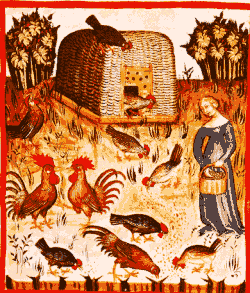Meet the Middle Ages
BackWomen

There were many resourceful women during the Middle Ages. Husband and wife depended on each other and worked together. By law, however, women had far fewer rights than men and a woman was expected to obey her husband. When a girl married, her mother and father had to approve of the marriage.
On a farm, both husband and wife, as well as the children took part in the work that had to be done. The wife took care of the animals and the milking. She spun, wove and made clothes. The husband took care of the work in the fields, ploughing and sowing. Every member of the family was expected to help with the harvest and hay-making. If the husband died, the wife took over the running of the farm and managed it with her children.
In town, husbands and wives depended on each other, too. Often they both worked in the workshops and helped each other to sell the wares. The wife would often be very familiar with her husband ´s business. If he died, she was able to take over his establishment. In this way, she could have the same position as any other merchant or craftsman in town. This happened in Kalmar when Christina Panipola took over the family bakery when her husband died.
Within a nunnery, women had a certain degree of freedom and prosperity. Here, they did not depend on a husband, and they did not go through difficult child-births. They enjoyed a reasonable standard of living and were respected by society.
The women of noble rank had quite a different position compared to the women on the farms or in town. The parents of a girl from a noble family would be planning an advantageous marriage when she was a young girl. A good marriage could strengthen the position and influence of the family. Quite often, a very young woman was married off to a much older nobleman.
Children were important in all families. When they grew up, they could take part in the daily work on the farm or in the workshop. For the noble families, the children were important, because they were the heirs of the family name. Childbirth could be very painful and dangerous for the mother.
If she became a widow, the noblewoman as well as the wife of a farmer or a citizen, could take over the responsibilities of her husband. Some of the most important people of the Middle Ages were women and widows: Queen Margareta and St. Birgitta.